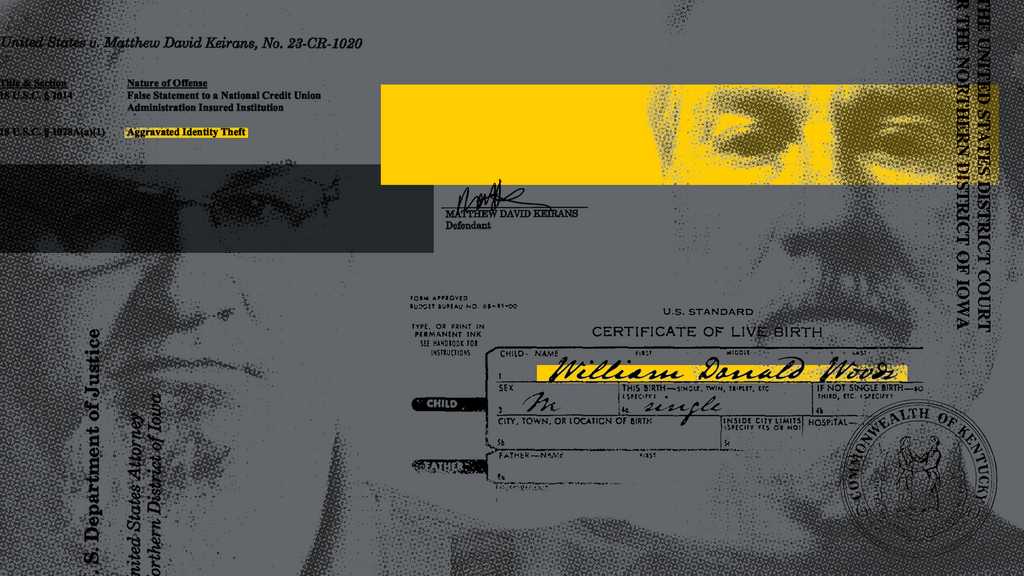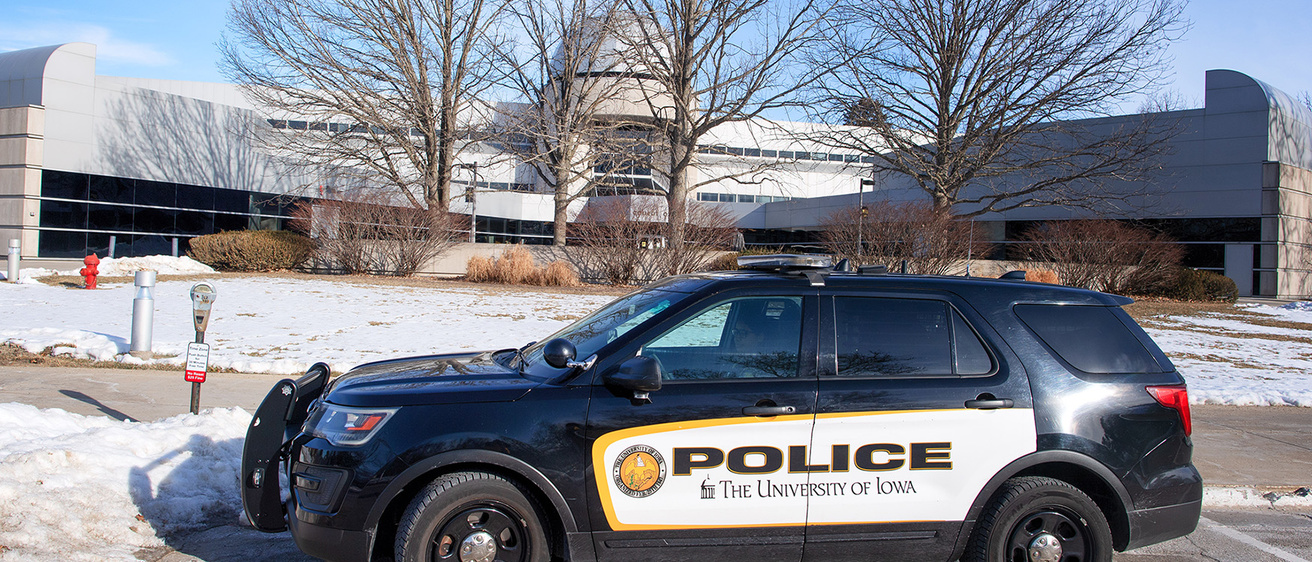Plenty of myths surround campus law enforcement, including whether officers are “real” police officers. Learn the truth about some of these myths.
Story: Emily Nelson
Photography: Justin Torner
Published: March 3, 2025
Over the past few decades, campus safety services have evolved significantly in response to increasing concerns about student safety and high-profile incidents.
While some campuses historically relied on unarmed security guards or part-time employees in the 1960s and ’70s, most modern campuses now employ sworn and highly trained police officers — and the University of Iowa is no exception.
The University of Iowa Police Department (UIPD) was established by a 1969 Iowa General Assembly statute. Before that, the university’s “Security Department” consisted of night watchmen and parking attendants rather than trained police officers or security guards.
Today at the UI, sworn police officers and certified security officers are just one layer of a multi-faceted approach to safety. The eight-department Campus Safety organization includes the UI Police Department, Security Services, Emergency Management, Threat Assessment, Clery Compliance, Security Engineering Services, Emergency Communications, and Fire Safety.
And rather than building a system that’s only responsive to crime, the University of Iowa team takes an “all-of-the-above” approach when it comes to prevention, which includes training campus law enforcement officers at a level that exceeds standards, a comprehensive threat assessment and intervention program, community preparedness, and collaborating with partners on campus and in the community to support safety and well-being.
Despite a more than 50-year history on campus, it’s not unusual for people to hear “campus police” and only think of security guards.
Ian Mallory, a detective for UIPD, says even some people in law enforcement don’t realize that a university campus can have a “real” police department. In fact, during a recent case in which he needed help from law enforcement agencies across the country, he says the first hurdle was sometimes just convincing them he was a real police officer.
Here are some common myths about the UI Police Department and the truths about them.
Myth: Officers with UIPD are not “real” police officers
University of Iowa police officers are state-certified, meaning they have the authority to enforce laws and investigate crimes. They undergo extensive training to ensure they are equipped with the knowledge and skills necessary to respond to the variety of situations that can occur on a college campus.
UIPD provides law enforcement services 24 hours a day, seven days a week, responding to all calls for service and investigating all criminal incidents that occur on university property.
And, despite some stereotypes that would suggest that campus police are just former municipal officers waiting to retire, Mark Bullock, assistant vice president of Campus Safety, says that doesn’t necessarily reflect the reality of campus policing at Iowa.
“That is just not true here. We have career police officers who are growing their careers, innovating in the profession, and making us better every day,” Bullock says.
Myth: Campus police are not highly trained or experienced
UIPD training requirements include:
- Iowa Law Enforcement Academy: Training at the academy includes courses on trauma-informed interviewing, de-escalation, ethics and professionalism, stress management, use of force, defensive tactics, and more.
- Field Training Program: Upon graduation from the academy, new officers are required to complete an intensive training program to help them prepare for solo patrol.
- Ongoing training: Officers receive ongoing supplemental training throughout their careers to keep their skills and knowledge up to date. This includes:
- Annual training on all state continuing education requirements, legal updates, and a variety of other topics.
- Annual training on de-escalation techniques and prevention of bias.
- Best practices for stopping an active shooter and other potential violent incidents.
- Crisis intervention training (how to safely de-escalate mental health crisis situations).
They also must pass various tests as part of the hiring process, including:
- Physical agility test
- National Police Officer Selection Test (POST)
- Thorough background investigation and driver’s license verification
- MMPI II psychological test
- Medical physical
- Drug screen
UIPD works closely not only with departments in surrounding jurisdictions but those across the state as well.
“I don’t know how many other university police departments have other state law enforcement partners bringing them in to help with cases,” says Lucy Wiederholt, chief of UIPD. “I take a lot of pride in that. They trust that we have the experience to help with high-level crimes.”
Myth: They don’t have the same resources as a “real” police department
While there can be varying levels in campus policing, UIPD officers have the same access to the same resources any department would have — and in some cases more.
“We sometimes take for granted that we have a lot of things that other departments — sometimes even those that are much bigger than us — don’t have,” Bullock says. “We’re fully staffed 24/7 and provide a lot of different services. We have canines, we have bomb techs, we have detectives, we have a drug task force officer, and we have a digital forensics lab that we share with our partners in Johnson County.
“We have a lot of resources that other departments would love to have, and we do our best to use them to assist law enforcement agencies across the state.”
UIPD’s resources extend beyond tools of the trade. Often the most important resource is having the time to dedicate to providing high-quality service to victims and following up on leads to investigate crimes to their full extent.
“We have a lot of resources, but we also have a lot of dedicated people,” Wiederholt says. “And because our call volumes are somewhat lower than some departments, we have the luxury of leaning into our service a bit more heavily, which allows us to be a little more victim focused. We can take extra time with people to make sure they get connected with supportive resources.”
Myth: It’s just a campus police department; they only handle minor issues
University of Iowa Police Department officers are trained to respond to any crime that any other police officer in any city is.
“And if they’re seeing a crime, we’re seeing it,” Wiederholt says. “There’s just not a big difference in the kind of things we’re investigating and handling on a daily basis, just maybe on a smaller volume.”
Mallory says the University of Iowa is its own city inside Iowa City.
“Everything any other major city has — socioeconomic backgrounds, personalities, nationalities, trades — we have here, just in a more concentrated environment,” Mallory says.
The department responds to more than 15,000 calls for service during the average year and has the resources to tackle anything ranging from vandalism to a complex identity theft scheme that spanned decades.
What is different is the high number of young adults on campus.
“Undergraduate students are 18 to 22 years old; their frontal lobes are still developing,” Bullock says. “We’re casting these kids out in the world and they’re trying to figure everything out. So, we do have an inherently vulnerable population, and we do our best to make education a part of our daily operations.”
In addition to responding to and investigating crimes, Campus Safety prioritizes providing training programs, safety tips, and consistent opportunities for students and employees to interact with the department and share suggestions or concerns.

UI detective unravels identity theft scheme
Thanks to Ian Mallory’s investigation, which involved untangling hundreds of documents and obtaining a crucial DNA test, a California man who had been falsely imprisoned and involuntarily hospitalized for saying he was who he said he was regained his true identity.
Myth: Campus police are only here to enforce the rules
While enforcing laws and policies is part of their job, campus police are also focused on community engagement, crime prevention, and connecting students with supportive resources to help them be academically successful and graduate on time, despite the challenges they may face.
For example, Campus Safety contributes funding to the university’s Student Care and Assistance program, which helps connect students with follow-up resources if they are experiencing a crisis or emergency. These coordinators are embedded in Campus Safety spaces and are frequently brought in to assist students who may need additional support following a safety concern.
When possible, care coordinators may even respond to a call with a police officer when appropriate.
The department also provides myriad resources to students and employees so they can be as prepared as possible in the event of an emergency. These include emergency notifications, safety training courses, free late-night transportation, bike registration, and a safety app that allows users to set a safety timer for their walk home, text anonymous tips to police, and call for help with the touch of a button.
